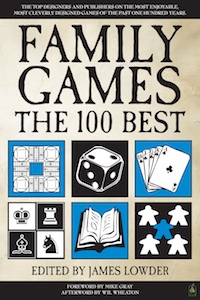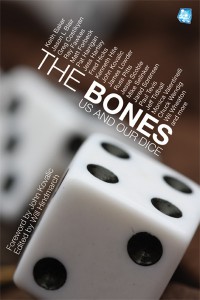Hi everyone,
I am pleased to announce that I’ve got three, non-fiction releases related to hobby gaming available for you to check out.
 First, if you haven’t had the chance to check out FAMILY GAMES: the 100 BEST, I’d recommend that you consider getting your copy signed if you’re heading to GenCon in Indianapolis. Several of the essayists, including yours truly, will be at the convention. Also, you might want to head over to the Green Ronin booth and track down James Lowder for his signature. Not only did he edit the book, he’s also an outstanding author in his own right.
First, if you haven’t had the chance to check out FAMILY GAMES: the 100 BEST, I’d recommend that you consider getting your copy signed if you’re heading to GenCon in Indianapolis. Several of the essayists, including yours truly, will be at the convention. Also, you might want to head over to the Green Ronin booth and track down James Lowder for his signature. Not only did he edit the book, he’s also an outstanding author in his own right.
This year, you can find me at the GenCon Writer’s Symposium which is managed by author Jean Rabe. I’ll be writing a post about what panels I’ll be on later.
My second release is a very “heady” essay about dice and divination for THE BONES, which was edited by Will Hindmarch and published through Gameplaywright. What is this book about?
The Bones gathers writing about fandom and family—about gamers, camaraderie, and memories— and ties them together where they meet: our dice. These are essays and anecdotes about the ways dice make us crazy, about the stakes we play for and the thrill we get from not knowing what the next roll will bring. –SOURCE: THE BONES at Gameplaywright.net.
 My contribution to THE BONES took on a more intellectual, esoteric approach. I talked about how the act of rolling dice draws upon a form of divination that employs the use of dice; I also mentioned how players like us often take on the role of the divine, because we typically determine what happens to our characters through a simple roll of the die.
My contribution to THE BONES took on a more intellectual, esoteric approach. I talked about how the act of rolling dice draws upon a form of divination that employs the use of dice; I also mentioned how players like us often take on the role of the divine, because we typically determine what happens to our characters through a simple roll of the die.
After reading through our limited edition copy, I have to say that I feel Will did an absolutely outstanding job as editor. He provided a healthy potpourri of entertaining anecdotes and intellectual discourse that offers something for everyone to read. If you like to game, you can order a copy now or buy one in the dealer’s room at GenCon this upcoming August. Similar to FAMILY GAMES: the 100 BEST, several of the essayists and contributors will be floating around to sign your copy of THE BONES.
Last, but not least, I also wrote an essay about how powerful convention demos can be to attract new players for this year’s release of the RPGirl Zine. RPGirl is a project led by Emily Care Boss that highlights women in the gaming industry. In addition to this essay and my bio, Emily was kind enough to promote THE QUEEN OF CROWS e-book. I’m not one-hundred percent sure if she’ll have her own booth presence this year or not, but I do know that the RPGirl Zine will be available, along with THE BONES, at the Indie Press Revolution booth.

 After a very, busy week following
After a very, busy week following